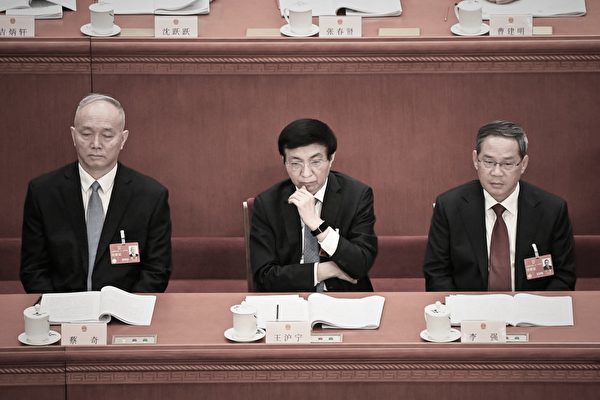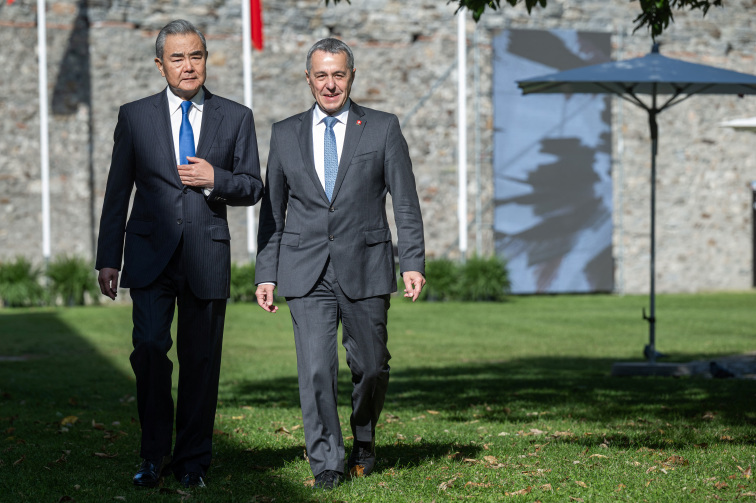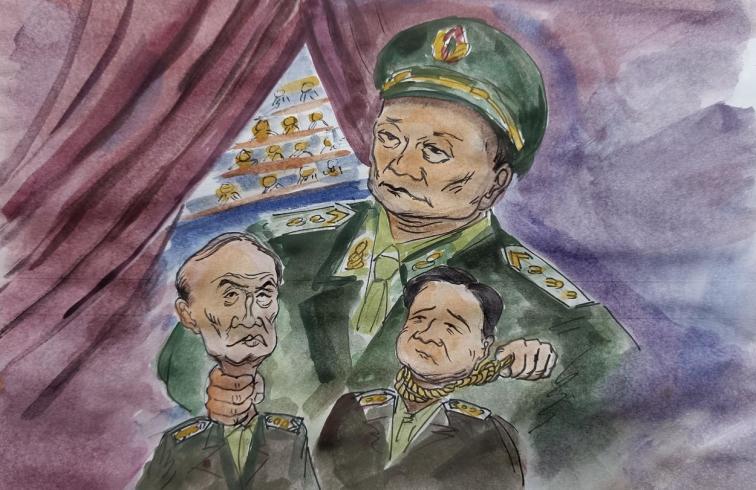March 11, 2023: Senior members of the CCP’s Central Military Commission line up to take the oath at the National People’s Congress. From right to left: Zhang Youxia, He Weidong, Li Shangfu, Liu Zhenli, Miao Hua, Zhang Shengmin. (Lintao Zhang/Getty Images)
[People News] The Fourth Plenary Session of the CCP’s 20th Central Committee has concluded. The number of Central Committee members who attended was strikingly low — one-sixth were absent! Of the 42 military representatives elected to the 20th Central Committee, 27 were missing. Some have fallen from power; others have “disappeared,” with reasons unknown. Observers of Chinese politics and the economy abroad are shocked.
He Weidong was once regarded as Xi Jinping’s “trusted confidant among confidants” within the military. In 2019, he was only commander of the Eastern Theater Command — neither a Central Committee member nor an alternate. Yet in 2022, at the CCP’s 20th National Congress, he was extraordinarily elevated from the Joint Staff Department to Vice Chairman of the Central Military Commission (CMC) and brought into the Politburo — a meteoric rise based solely on Xi’s personal trust.
The second figure is Miao Hua, a CMC member and head of the CMC Political Work Department, viewed as the key architect of Xi’s “political army-building” campaign and the one who controlled military personnel appointments.
Even more astonishing is He Hongjun, executive deputy director of the CMC Political Work Department. On July 9, 2024, Xi Jinping held a special ceremony solely for him to receive the rank of general — an extremely rare honor. His subsequent downfall came with shocking speed.
So when did the sword fight between Xi and Zhang Youxia within the military begin? One need only glance at news from 2023 to find clues.
I. The Investigation of Li Shangfu Revealed Deep Rifts in the Military
On September 17, 2023, Voice of America published an article titled “The PLA Cleans House — Is Xi Jinping Using the Li Shangfu Case to Declare War on CCP ‘Princelings’?” It noted that Li Shangfu had just been appointed Defense Minister on March 12, 2023 — and by September, he was under investigation. Radio Free Asia reported on September 15 that Li’s last public appearance was on August 29, following visits to Russia and Belarus in mid-August. This showed that Xi’s loyalists — He Weidong, Miao Hua, and others — had begun attacking Zhang Youxia’s faction.
Exiled commentator Yao Cheng revealed in 2023 that “the real money in the military isn’t from small perks — it’s from the Equipment Development Department, where the sums reach tens or hundreds of billions.” Xi only investigated procurement cases after 2017 — the period during Li Shangfu’s tenure — a highly targeted move.
Public records show Li served as Deputy Minister of the General Armaments Department in 2013, while Zhang Youxia was Minister in 2012. Investigating Li without touching Zhang seemed impossible. Perhaps Xi initially intended to spare Zhang — and that may explain why Zhang later offered Xi a “graceful exit.”
II. Xi’s Confidants and His Wife in Trouble
In September 2023, Yao Cheng analyzed that beyond purging the Rocket Force and toppling Li Shangfu, Xi likely wanted to use Li’s case to declare war on the “Red Second Generation” (children of revolutionary leaders) within the Party. He noted that the only remaining “Red Second Generation” powerholders in the military were Zhang Youxia and Li Shangfu.
Public records show Li Shangfu’s father, Li Shaozhu, joined the Red Army in 1932, participated in the Long March, the Anti-Japanese War, the Chinese Civil War, and the Korean War, and later served as Deputy Commander of the PLA Railway Corps Southwest Command — a bona fide old CCP cadre. Zhang Youxia’s father, Zhang Zongxun, was a close comrade of Xi Jinping’s father, Xi Zhongxun. Xi treated Li Shangfu ruthlessly, but persuaded Zhang to retire. After Xi forced Zhang Youxia’s retirement, Zhang no longer displayed any respect toward Xi in public.
From July 15 to 18, 2024, the CCP convened its Third Plenary Session — during which rumors spread that Xi Jinping had suffered a stroke.
On November 15, 2024, overseas dissident Zhao Lanjian reported that “Miao Hua’s arrest was widely discussed among the Beijing Red Second Generation circles,” saying, “Miao Hua was taken away with a hood over his head — many people in his neighborhood saw it.”
On November 28, 2024, Defense Ministry spokesperson Wu Qian announced at a press briefing: “CMC member and Director of the CMC Political Work Department General Miao Hua is suspected of serious disciplinary violations. The Party Central Committee has decided to suspend him for inspection.”
The CCP generally has four levels of disciplinary handling:
-
Minor violations — criticism and education;
-
Ordinary violations — suspension;
-
Serious violations — demotion, dismissal, or expulsion;
-
Serious violations and lawbreaking — expulsion and judicial transfer.
Miao Hua’s suspension for “serious violations” suggested leniency — likely meaning his case was investigated by CMC Discipline Chief Zhang Shengmin and handled by Central Commission for Discipline Inspection head Li Xi.
Legal scholar Yuan Hongbing claimed that after interrogation, Miao Hua “confessed or implicated over 1,300 senior military officers — including generals, lieutenant generals, and civilian officials — in disloyalty, corruption, or promotion-buying.”
On March 12, 2025, Zhao Lanjian revealed: “CMC Vice Chairman He Weidong has been detained, and his homes searched!”
His exact words: “According to authoritative sources, on March 11, Politburo member and CMC Vice Chairman He Weidong was taken away right after the 2025 Two Sessions concluded. His residences in Beijing and Shanghai were searched. The situation is extremely tense.”
On April 25, 2025, Zhao Lanjian tweeted that Lin Xiangyang, Wang Houbin, and Qin Shutang were also detained for investigation — showing that Xi’s trusted 31st Army faction had lost influence in the military.
Another key to assessing Xi’s loss of power in the military is Peng Liyuan. Sing Tao Daily reported on May 5, 2024, that after stepping down as President of the PLA Arts Academy in 2017, Peng’s military role was unclear. Recently, social media circulated photos of Peng visiting a military institution, captioned: “Peng Liyuan, full-time member of the CMC Cadre Evaluation Committee, visits to study high-level talent development.” Peng reportedly held that role since 2017, but after Xi’s stroke in May 2024, she no longer served as a military evaluator.
Looking back at the upheavals in the military leadership following Li Shangfu’s downfall, it’s clear that Xi and Zhang Youxia had long been at odds. The question now is — will Xi stay or step down?
III. A Congratulatory Letter Reveals the Succession Dilemma
Many overseas commentators believe Xi seeks a fourth term after the Fourth Plenum. Independent journalist Jiang Wangzheng repeatedly reported that Xi has publicly stated at least three times: “Next term, Li Qiang will lead.” But the recent issue over Japanese Prime Minister Sanae Takaichi’s congratulatory letter may signal that Li Qiang cannot succeed him.
According to Nikkei News, Li Qiang sent a congratulatory telegram to Takaichi on October 21, the day she took office. Oddly, Beijing has not released any confirmation or content of such a message. When asked about it on October 23, Foreign Ministry spokesman Guo Jiakun replied, “China has made appropriate arrangements in accordance with diplomatic conventions,” emphasizing that China hopes Takaichi’s cabinet will honor commitments on major issues such as history and Taiwan, and will work to advance mutually beneficial strategic relations.
Takaichi, however, appeared magnanimous — unfazed by whether Xi had sent her a message. Public statements show she is “prepared to build a constructive and stable relationship with China where necessary.”
If Xi’s diplomatic conduct pales in comparison to that of a female leader, where is his dignity? Li Qiang had just returned from Pyongyang “full of grievances,” only to be tasked with sending congratulations to Japan’s new female prime minister on Xi’s behalf — while Xi himself remained aloof, sending a letter instead to Taiwan opposition leader Cheng Wenli. Such petty posturing may convey power at home but, on the international stage, it damages Xi’s image, making him appear rude and insecure.
From the arrangement where “Li Qiang visited North Korea and sent congratulations to Japan’s Takaichi on Xi’s behalf,” it’s clear Xi merely treats Li as a diplomatic “shield.” Xi himself stays behind the curtain, granting Li no real power. This setup makes it clear that Li Qiang has no authority or credibility on the world stage — and absolutely no chance of succeeding Xi.
(First published by People News) △











News magazine bootstrap themes!
I like this themes, fast loading and look profesional
Thank you Carlos!
You're welcome!
Please support me with give positive rating!
Yes Sure!